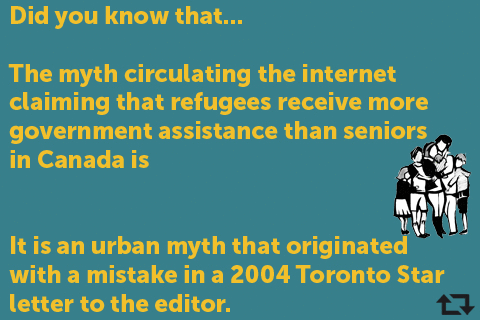A hoary old chestnut of a rumor circulating for years has made yet another appearance ahead of the 2018 American midterm elections:
Only in Canada.
Do not apply for your old age pension. Apply to be a refugee. It is interesting that the federal government provides a single refugee with a monthly allowance of $1,890.00 and each can get an additional $580.00 in social assistance for a total of $2,470.00.
This compares very well to a single pensioner who, after contributing to the growth and development of Canada for 40 or 50 years, can only receive a monthly maximum of $1,012.00 in old age pension and Guaranteed Income Supplement.
Maybe our pensioners should apply as refugees!
Let’s send this thought to as many Canadians as we can and maybe we can get the refugees cut back to $1,012.00 and the pensioners up to $2,470.00, so they can enjoy the money they were forced to submit to the Canadian government for those 40 to 50 years.
Please forward this to every Canadian you know.
That figure appears to be bolstered by other chain emails and viral posts, lending validity to the rumor. It received attention again in 2017, when a photograph was used as purported evidence that Canada pays “illegal refugees” (whatever that means) $3,864 per month in federal assistance.
A screengrab of a document from the Resettlement Assistance Program does indeed list $3,874 in refugee assistance, and is often shared with the following comment:
This is what 1 illegal refugee gets with the federal assistance program $3874 per month!!

This document has been used to advance false claims that each “illegal refugee” in Canada receives $3,874 per month.
These claims have mutated from Canada to the United States to Australia and beyond. They were inaccurate from the very beginning.
Canada Pays Refugees $3,874 a Month: Dispelling the Myth
First of all, the characterization of these refugees as “illegal” is false. The word “refugee” (like “asylum-seeker“) is a specific legal term with a specific legal status, and as such the phrase “illegal refugee” is a contradiction in terms, making it not only meaningless, but misleadingly so.
Second, the claim is that each refugee receives $3,874 per month, but the top of the document clearly states “Family Size: 5.” The $3,874 payment was for five people — not one person. (In the United States, refugees receive small sums of financial help for only the first eight months, some of which they are obligated to pay back.)
Third, the document lists $1,950 in “Start-Up Allowances.” Those allowances are not included in recurring monthly payments. A category on the document titled “Regular Monthly Benefits” outlines $1,399 in payments, and that is what the family of five would receive each month.
Finally, in 2014, Canada paid $64.3 million to resettle 7,100 refugees. That adds up to about $9,000 per refugee, and that demonstrates how skewed this rumor is. It would cost $46,488 per refugee if Canada paid each of them $3,874 per month.
This rumor first emerged in 2004, when the Toronto Star was the unwitting recipient of the sort of disinformation blast that would characterize social media a decade or so later. The Canadian Council for Refugees has an entire page dedicated to the rumor, along with a comment from one of the newspapers’ ombudsmen detailing how it first caught on in the public discourse:
Today’s rather sad and twisted tale began last March when the Star published a feature about plans to settle hundreds of African refugees in smaller Canadian cities. It was a simple story: Canada and the United Nations were flying asylum-seekers from a Somali refugee camp to new lives in centres such as Hamilton. As immigration/diversity reporter Nicholas Keung wrote, immigration officials hope to encourage (but not force) refugees to make new lives outside the magnet cities of Toronto, Montreal and Vancouver. “We hope by relocating them all together and resettling them as a whole to the same community, we can create a positive environment to help them integrate into the Canadian society successfully,” an immigration official explained.
Fine and dandy. But halfway through the 1,500-word article, unforeseen trouble was lurking. In paragraph 16, the story said single refugees are eligible for $1,890 from Ottawa as a “start-up allowance, along with a $580 monthly social assistance, depending on how soon the person is able to find employment.” In addition, they get “a night lamp, a table, a chair and a single bed from the government,” the story said. In painful hindsight, those details could have been clearer. Actually, the $1,890 “start-up allowance” – including a $580 monthly social assistance cheque from Ottawa – was a one-time payment for basic household needs such as furnishings, pots and linens. The furniture is used. In quick order, two things happened after the article ran. First, a reader sent a nasty e-mail to the reporter. Among other things, it said charity begins at home and Canada should not “roll out the welcome mat” for refugees. The e-mailer assumed – erroneously – that the refugees would collect $2,470 a month. They’d be better off than Canadian pensioners.
More worrisome, the polemicist sent his rant to 100 recipients, some of whom likely spread the word to wider audiences. Ah, the wonders of the Internet! Alarmed by the e-mail, reporter Keung tried to contact the sender. It was too late. Having spread the misinformation, the e-mailer already had changed his address. At the same time, a second development occurred. The Star ran a letter to the editor that said the $2,470 “compares very well to a single pensioner who after contributing to the growth and development of Canada for 40 years can only receive a monthly maximum of $1,012 in old age pension and Guaranteed Income Supplement. “Maybe our pensioners should apply as refugees?” reasoned the writer.
Readers may not realize that fact checking of letters to the editor is nearly impossible at most daily papers, given limited staff resources and unforgiving deadlines. Although many mistakes are caught, the occasional doozer gets through. That was definitely the case here. Over the next several months, it became increasingly clear a disturbing urban myth had been born. Various offices at the Star have been getting e-mails from around the world, usually one or two a week. Many quote from the erroneous letter to the editor, expressing varying degrees of curiosity, dismay, envy or anger. “Let’s send this to all Canadians,” one e-mail roared, “so we can all be p—– off and maybe we can get the refugees cut back to $1,012 and the pensioners up to $2,470 and enjoy some of the money we were forced to submit to the government over the last 40 or 50 years.” In hindsight, the ombud now wishes he’d issued a speedy clarification to help set the record straight. But with information (and misinformation) moving at warp speed on the Internet, I doubt there was a silver bullet for the problem. Maybe this column can help dispel a damaging misperception about refugees and pensioners. Please tell your friends.
The Council’s page even came with its own animated gif:

The Star returned to the rumor it inadvertently started in late 2015, when its public editor implored readers not to fall for it again:
The Star itself republished this misinformation last week– once again, in a letter to the editor.
The Dec. 2 letter, entitled, “Let’s help ourselves first” stated “Canadian seniors who worked and paid taxes all of their lives are worth only $550 a month, but soon-to-be-voting refugees will get $2,500 a month plus benefits.”
That resulted in an email from another reader who told me the history of the myth that refugees receive more government assistance every month than seniors do and implored, “Please do what you can do to stop this before it starts again.”
The public editor’s piece contained a telling quote that should serve as a warning. Numbers are often used to lend credence to completely false stories, especially random values that have not been rounded, because they confer an air of expertise to the disinformation — which those pushing it surely know. As the column points out, even seasoned professionals fall for this rhetorical trick from time to time:
Letters editor Rob Wright thought the numbers cited by letter writer Patricia Starr looked “feasible” and, given that her past published letters have not presented any issues with facts, he trusted she had her facts right this time.
“Mea culpa,” Wright told me. “The lesson for me is to watch out for letters that state specific numbers.”
- U.S. Office of Refugee Resettlement. "The U.S. Refugee Resettlement Program – an Overview."
- Benefits.gov. "Refugee and Entrant Assistance - State Administered Programs."
- The Refugee Center. "Public benefits."
- KSTP. "Cost of Freedom: Many Refugees Arrive in U.S. in Debt to Government For Their Travel."
- International Justice Resource Center. "Asylum & the Rights of Refugees."
- Canadian Council for Refugees. "Refugees and income assistance - rebutting the chain email ("pensioners' myth.")"
- English, Kathy. "A mistake that travelled around the world and back again: Public Editor."
- UNESCO. "Asylum Seeker."
- Zamfir, Ionel. " HOME PUBLICATIONS BLOG GRAPHICS WAREHOUSE SCRUTINY TOOLBOX ABOUT Refugee Status Under International Law."

